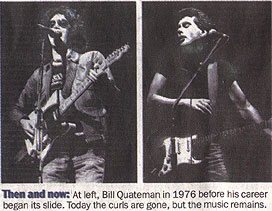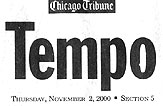The memories come in black and white, often accompanied by the sounds of a piano, the haze of cigarette smoke, and the names of bygone clubs such as Orphan's, the Fifth Peg, Happy Medium, Amazingrace and Quiet Knight. These are music memories, from Chicago of the late 1960s and early 1970s, and for many people they carry with them a question: Whatever happened to Bill Quateman?
 It's an interesting question, because of all the young performers in Chicago at the time --John Prine, Steve Goodman, Bonnie Koloc and so many other talents -- Quateman seemed the most likely to succeed. In 1971, Quateman was called by Chicago Today critic Bruce Vilanch, "the most exciting pop musician Chicago has produced since the twilight of the jazz era," and two years later he had his first album out, "Bill Quateman," and was living in Los Angeles.
It's an interesting question, because of all the young performers in Chicago at the time --John Prine, Steve Goodman, Bonnie Koloc and so many other talents -- Quateman seemed the most likely to succeed. In 1971, Quateman was called by Chicago Today critic Bruce Vilanch, "the most exciting pop musician Chicago has produced since the twilight of the jazz era," and two years later he had his first album out, "Bill Quateman," and was living in Los Angeles.
Who might have imagined, then, that it would be Vilanch --with high-profile writing gigs for stars such as Billy Crystal and Bette Midler, a theatrically released documentary about his life, and a spot on the TV show "Hollywood Squares"--who would become a big star while Quateman faded into obscurity? But Quateman's back now, on an eponymous Web site, and in the flesh with a short series of concerts here. He is scheduled to perform at 8 and 10 p.m. Thursday at Fitzgerald's, 6615 W. Roosevelt Rd., in Berwyn; at 7:45 p.m. Friday at Schuba's, 3159 N. Southport Ave.; and at 10:45 p.m. Saturday at the Heartland Cafe, 7000 N. Glenwood Ave.
Though Quateman gave a mid-October performance on the campus of Northwestern University, these upcoming shows will be his first Chicago club dates in more than two decades.
"Let's say I'm being dragged back quite willingly," says Quateman. He sounds, on the phone from his home in Los Angeles, eager to return, recalling how he grew up in Evanston, taught himself to play the guitar at 10 by listening to Peter, Paul and Mary tunes, was playing clubs as a teenager, was hailed as one of the brightest singer/songwriters of the time, and was courted by such heavyweights as Columbia Records chief Clive Davis who ultimately signed him to the label as his personal project. He was even able to remember something he told a reporter in the 1970s: "I said I didn't really want to leave Chicago. But Los Angeles is where the action is, so . . ."
It is also where the hassles and heartbreak were, and Quateman has had his share of both.
He now says, "Call me naive, innocent, in denial. . . . The whole celebrity thing was a pull. David Geffen is calling you. Joni Mitchell wants to go to lunch."
In L.A., his second album for Columbia fell into a creative wrestling match with producers who wanted, Quateman says, "to turn me into Tony Orlando & Dawn."
What was to be called "Ties That Bind" was never released. And it was five years before he was signed by RCA, where his albums, "Night After Night," "Shot in the Dark" and "Just Like You," were modestly successful with critics and registered only modest sales.
He put together various bands for club dates. He continued to write songs. He talked with new labels. But by the time his first child, son Dylan, was born in 1987, he was exhausted by the grind of the L.A. music scene. With enough money coming in from singing on commercials -- a job arranged by old Chicago pal Gary Klaff -- and from royalties paid by other performers who had started recording his old songs, he decided to stay home and raise Dylan and, later, a daughter, India Rain, who was born in 1995.
"It was a no-brainer, a non-decision," he says. "I have always done what charmed me, and watching the miracle of life unfold was the most charming and important thing I have ever witnessed."
He and his wife divorced, and he became a single dad. He took other jobs -- a waiter, a production assistant -- to help support the family. He did not talk about his musical past with his kids. The stories of club dates and broken promises felt to him, he says, "like bits from a photo album." But music was still part of his life, manifested in performances of Beatles songs at his son's school and the ongoing creation of a children's movie musical. He did continue to write songs.
"Couldn't help that, but I did it, about three albums worth of songs, without any aim to get them recorded," he says. "It's just what I do. I often say, `Who do you have to sleep with to get out of this music business?'"
A couple of years ago his brother Neil, once the technical director of Bill's bands and something of an early Internet explorer, kept telling him about the increasing number of e-mails he was getting inquiring about Bill and his music. Neil finally convinced Bill that the most effective (and potentially lucrative) way to deal with these queries was to launch billquateman.com. "It was really moving, all of these people who were still interested in me, in my music," he says. Billquateman.com is a handsome site, featuring links enabling visitors to purchase his first album and, next month, the never-released "Ties That Bind."
The Web site also features a number of photos of the young Bill, with the Byronesque look, complete with the thick curls that made him the dreamboat of the 1970s Chicago club crowd.
"Initially, I just thought the site would merely be a good vehicle to sell CDs of the first album and that might help pay for the kids to go to college," he says. "But I now see it as an effective way of breaking out of the box. The record companies don't know how to sell and market anything but boy and girl bands. The Internet represents a great new way for music to be bought and sold, without the hassles of the traditional music biz machine." The success of the Web site got Quateman thinking about performing again. Andy Frances, an old pal from the Chicago days and later a consultant to stars such as Garth Brooks and David Bowie, further prodded Quateman back to the stage, offering to oversee a "comeback." And so, here he is, back where he came from. "Anybody coming to see the old hairdo will be disappointed," he says, laughing.
Quateman's guitar, piano and vocals will be harnessed to the performance of what he calls "chamber rock," accompanied by an electric guitar and cello. Most of the live material will be songs from his first album.
"The essence of the songs will be the same," he says. "But I have changed, and the audience has changed. But there is something special that happens when people reunite. Maybe it's that we learned we need each other and always have. I'm so grateful to these people who remember. They have helped remind me what most intrigued me then and sustains me now, the idea of making magic
with music."
Copyright 2000, The Tribune Company
 NEARLY 30 YEARS LATER, A WAYWARD SON BRINGS HIS MUSIC BACK HOME
NEARLY 30 YEARS LATER, A WAYWARD SON BRINGS HIS MUSIC BACK HOME  It's an interesting question, because of all the young performers in Chicago at the time --John Prine, Steve Goodman, Bonnie Koloc and so many other talents -- Quateman seemed the most likely to succeed. In 1971, Quateman was called by Chicago Today critic Bruce Vilanch, "the most exciting pop musician Chicago has produced since the twilight of the jazz era," and two years later he had his first album out, "Bill Quateman," and was living in Los Angeles.
It's an interesting question, because of all the young performers in Chicago at the time --John Prine, Steve Goodman, Bonnie Koloc and so many other talents -- Quateman seemed the most likely to succeed. In 1971, Quateman was called by Chicago Today critic Bruce Vilanch, "the most exciting pop musician Chicago has produced since the twilight of the jazz era," and two years later he had his first album out, "Bill Quateman," and was living in Los Angeles.